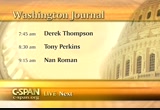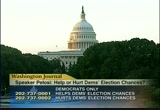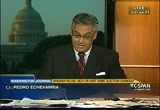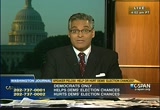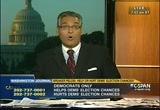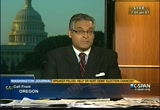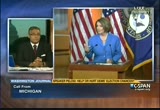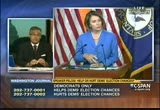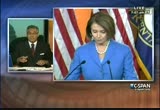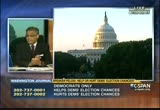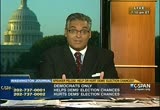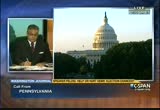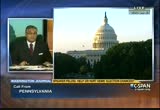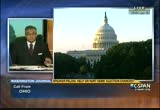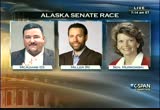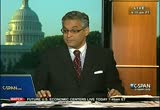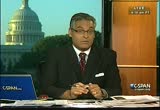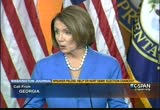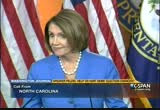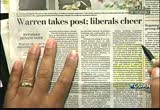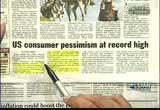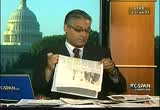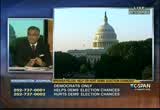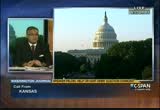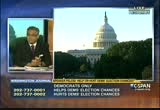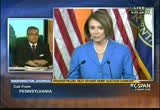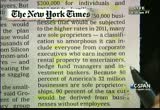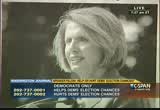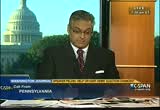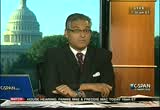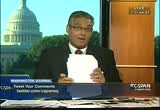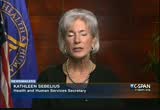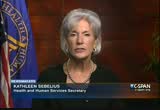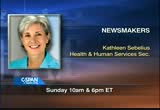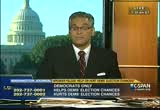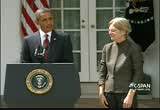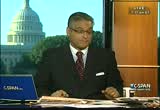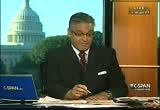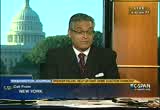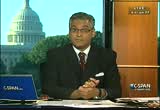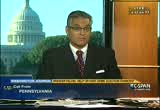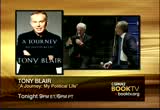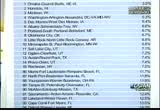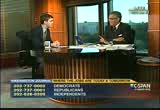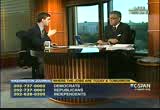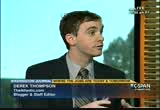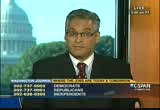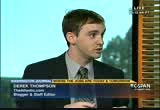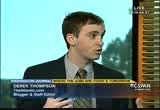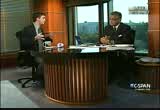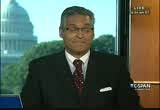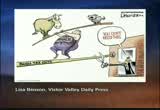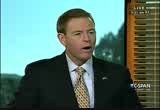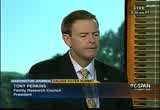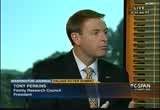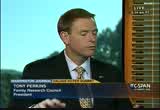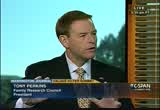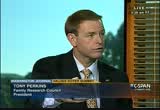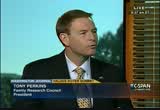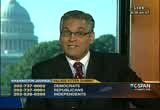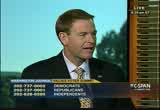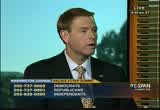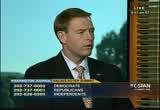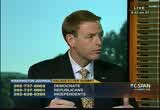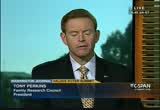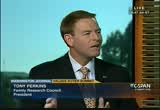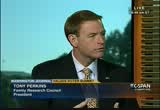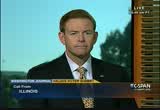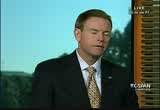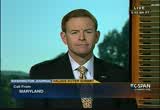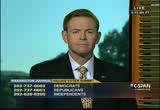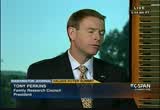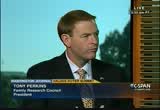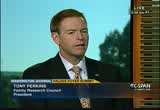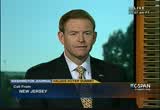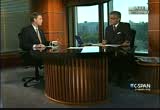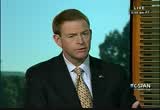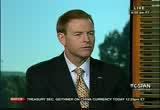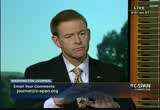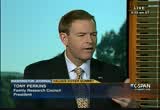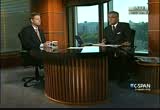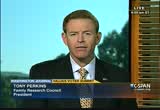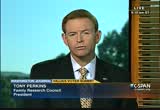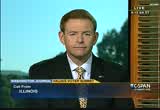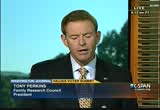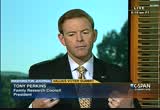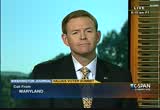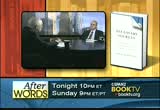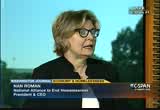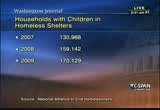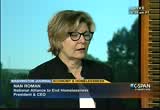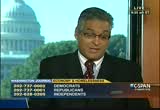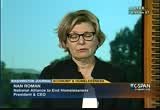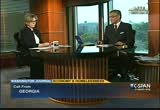tv Washington Journal CSPAN September 18, 2010 7:00am-10:00am EDT
7:00 am
>> in the paper this morning in regards to economic news, a new university of michigan polls shows that consumer pessism is high. another showing that net worth has dropped. russian government agencies have issued several web addresses suggesting presidenten is making another rn for presidency. and in the front page of the washington journal looking at politics. a story focusing on nancy pelosi, specifically looking at whether she will help or hinder democrats in this november's
7:01 am
election. so for the next 45 minutes november? if you want to weigh in via e-mail as well, you can do so. and if you want to use twitter. again, we take our focus for the 45 minutes for the front page story in the "wall street journal" this morning. taking a look at political story with speaker pelosi.
7:02 am
7:03 am
7:04 am
speaker pelosi this november. portland, yorle, on -- oregon, on our line who thinks she will help. caller: i think nancy pelosi has been consistent and correct in her political decisions. i think she is definitely good for the country. and we small -- small african american community are very strong supporters. i think that the media is kind of hyped up all the predictions about shrinking democratic ranks for the november elections. i think she will do just good in this part of country we support her strongly and wish her all the best. we hope that the democrats even increase their majority in the house of representatives. one last thing i'd like to comment on in terms of reparations. we hope that there will be some sort of legislation introduced that will give african
7:05 am
americans some sort of options in terms of immigration since african americans came -- the ancestors came to this country against their will. there may be an option for african americans to opt out and go back to africa under some sort of ah spisses of the united states as a choice of where they want to live. host: we'll leave your thoughts there. michigan on our line for we set aside looking at speaker pelosi and thinking that she will hurt election chances. this is tim. good morning. caller: good morning. well, the reason i'm calling and i believe that she is going to hurt democrats is i look at what happened to bart stupak here in michigan. i followed his career through the years and he has always been a solid conservative for the most part. i guess what most people call a
7:06 am
moderate democrat. host: you mean on his vote on health care? caller: right. basically i don't think he wanted to vote for it. and she forced him to. she strong-armed him into voting for that. it basically destroyed his career. i think he had to bow out of running again because of what she did to him. host: so that was specifically looking to mr. stupak's career. what do you think about the larger issues of democrats in general this november? how do you think she will hurt their causes? caller: i think she will hurt their causes because she always imposes her will on what they want to do. so they really have no freedom to even vote the way they want to. and i think her personality is so polarizing. i think she hurts the party. host: do you think that idea attributes to her position as house speaker, though, as far as getting people to vote in line with her? caller: i think it does. because she is not just leading
7:07 am
her party, she is supposed to be leading the country. and most people are -- i think they despise her because of her personality. host: next call is illinois, on our line, go ahead. caller: yes. i think speaker plose ais doing a great job. due to the fact that she is keeping the house in line. the problem is that democrats need to stand up together just like the republicans do. that's the problem. you have conservative blue dog democrats, the liberal democrats. they need to come together, stand together as democrats and vote together as democrats, and they can get things done. speaker pelosi has had it where the house has passed so many bills and the senate has stalled on everything. so i think she is going a great job and i hope she continues to be the speaker.
7:08 am
host: our previous caller mentioned representative stupak and the relationship that his vote on health care, relating it to influence from nancy pelosi saying that he hurt her -- or sher hurt him in the end. what do you think about those who maybe would vote against the leadership as far as how they fair this nober and how they work in the house? caller: well, i think what the problem is information that's gone out as far as health care just hasn't gotten out there yet. we haven't even gotten time for all of the rules and laws of the health care bill to be out there. and of course you have the right spinning that it's this great mandate and they're making up all kinds of lies, your grand mother is going to die. the truth needs to be told about the health care bill. host: off of twitter.
7:09 am
21% said that she did garner those feelings, 35% said they felt very negatively about her. 46% said they felt positively about the president, 27% said they felt very negative. michigan. on our line for those whoible that she will hurt democrats this november. tell us why. caller: yes. i believe that one of the reasons looking way back in the election of 2006, the reason why that the democrats were so successful in taking over both houses there was the fact that, of the wars in iraq and
7:10 am
afghanistan and we hated those. and so when we got elected i thought sure that surely now then we will get out of at least one of those, especially iraq, where we weren't supposed to be going in the first place and then as soon as that was over, president bush had put on the docket some, i don't know how many billions of dollars to support the war. nancy pelosi bowed in humble adoration and they voted for that. and from that point on, i just never had any confidence in this lady whatsoever. and i never will. because she is such a flip-flop on certain items. we voted for the democrats there to get us out of those wars. host: do you think for the "wall street journal" to make a tie between her as the speaker and how november or democrats do in november, do you think that's a fair comparison or at
7:11 am
least a fair assumption? caller: absolutely. host: why so? caller: it will hurt us. host: pittsburgh, pennsylvania. good morning. caller: good morning. thank you for c-span. host: go ahead. you're on. caller: i'm speaking to you. i think it's a regional issue. i can see here in pennsylvania that the ads are linking suss tack running against tomby with pelosi as a negative ad. and they're appealing to the tea section of the state which is more conservative. i don't think it's going to work, but i think what's relative in the south, they
7:12 am
just can't stand nancy pelosi and they don't know anything about her. i'm from the san francisco area and i supported her since she first ran for congress and she's a wonderful intelligent person. and i just can't believe that there's just this blind hate toward her. so i think it's going to be a regional issue just like the man that spoke from oregon who is a big supporter of nancy pelosi. and that area should be a help to any candidate. and in the city areas of pennsylvania like the pittsburgh region and the philadelphia region, she would be a help to any candidate. but some of the ads they're running tor toomy against sestak are running against as a
7:13 am
negative. so i think it's a regional issue and it just emphasizes how divided the country is right now. host: ohio is next. good morning. caller: good morning. host: go ahead. caller: i think that nancy pelosi, like most of the congress and the senators in washington didn't read the health care package and they should have because i think what they're doing is just forcing down the american people's throats and the -- right here in their own town they're going to raise the insurance rates by 35%. and i just believe that she will hurt the democrats in the fall. and nay just -- they don't vote what the people want. i mean they've got to listen to their constituents back home and they're not doing that. it's just like there's a big wall there. they don't want to listen to
7:14 am
the voting public and that's going to hurt them. host: we'll hear from democrats only on speaker pelosi and if she will help or hurt democrats this coming november. you can call in with the lines on the screen. and you can send us e-mail and twitter as well. we'll look at some other stories. in alaska, a three-way race now that mur cows can i has decided to run as a write-in candidate. it will be her running as an independent, joe miller running as a republican, and scott mcadams also in the race as well. you can see by the race board as it reflects.
7:15 am
and in a related story, you probably saw just before this broadcast this morning sara palin addressing folks in iowa and dedes moines. as she was working and shaking hands, she was asked about the senate race now that senator mur cows kentucky decided to run as a write-in candidate. this is what she decided to say. >> [inaudible] she certainly has the write to do so but joe miller is the right person to help lead the state and the country. host: and a lot of noise there, but basically governor palin offering support to joe miller saying that lisa did have the right to run as a write-in candidate. back to speaker pelosi, her help or hindrance this fall for democrats in november. virginia, go ahead. caller: hi. i wanted to speak on nancy
7:16 am
pelosi in support of her voice for aiding the people. one of the things that i think that has happened is the republicans have controlled the message. however, at the end of the day when it comes time for them to stand forth for the voting, people are going to find out that the republicans are selling a product without instructions. and that is going to be detrimental to them and their message that they've been continuing to churn out. it's a marketing ploy. and it's a very good one at this moment, but i think when if educated population decides to actually tune back in and say let's get on the band wagon they're going to find out that the republicans have been selling poison to the people. host: so you're saying thingless change as we get close to november caller: absolutely. i don't necessarily believe in all polls. i do watch them. but i do believe that there is an issue right now with the people that they're calling. i don't think that every
7:17 am
person's household has been called and i think they're targeting certain areas to spin a message with certain polls. i'm an african american educated female and my home has been called once by a local poll service and i'm in northern virginia which is a heavily heavily populated area that seems like it's been left off the map with our voice. and we actually were one of those swing states. so i think that's important to chime in to people's -- to tune in early and find out what their thoughts are because they've been tuned in. not thees people that you just call and they give you random answers. host: good morning. caller: good morning. i think she will hurt the cause and i do believe this not through any fault of her own. i believe it's through the fault of, like your previous caller said, through the marketing ploy.
7:18 am
i really do believe that republicans have demonized her constantly, just like they demonized a lot of democratic running candidates and i really do believe that that's the way that she hurts the party, because no one has stood up to that demonization, that caricature that they have turned her into. host: north carolina. jesse, good morning. go ahead. caller: good morning. i think nancy pelosi will help the party. i think that what the republicans have done is distorted her credibility. she is a good leader and we need good leaders. and what we need is an educated public also. they need to be able to squish facts from -- disting wish facts from an individual who is
7:19 am
trying to distort someone's credibility. and in this case, i think that's what has happened and what the public needs to do is they need to oorn lies everything that has been said so that they can truly understand that what the democrats are trying to do for us this country, is something positive and not something negative. but everything the republicans say in reference to what democrats have done is negative. and no one can ever be wrong all the time. thank you. host: a couple of economic stories this morning. yesterday, the president chose the harvard law professor warren to act as a special adviser in the creation of a new consumer board. this will give her a chance to do that consumer financial protection board. it says here in a writeup
7:20 am
7:21 am
michigan consumer sentiment plunged in september to a one-year low primarily as a result of new discontent rising among the middle class. one more economic story to show you this morning, and i've got the wrong one, i apologize. we'll take a call. mike, go ahead. caller: i've got, it's actually a big question for all
7:22 am
democrats. why are they not talking about the health care bill? i'm more of a representative and stuff. i do not understand about everything, i'm still a young pup. but how come are they not telling everybody about the bill, what's going on out there? host: whether or not do you think they're not doing that? caller: because indiana is fighting for everything. how can i explain this. we're in court right now for the rights of every american out there. host: let me turn the question back. why do you think more democrats aren't talking about health care then? caller: i really don't know. host: and what do you think about speaker pelosi as far as
7:23 am
november elections? will she help or hurt? caller: oh, yeah. she will hurt. the only thing what she's got right now is a beautiful face. host: kansas, good morning to thomas. go ahead. caller: good morning. you know, the guy from indiana there, mike, he might be a young pup but he's got it kind of right. i think the democrats and nancy pelosi, speaker pelosi, should be talking about health care. good god gerty, why haven't -- it's taken four decades to get some kind of health care reform through. you know, -- host: why do you think they're hesitent, then? caller: because of the david
7:24 am
limb ba faction and the rush him baw. i call them lame bas. but it's so aggravating. can you understand the frustration in my voice? host: as far as making this into for those november elections, let me ask again then, specifically if they passed health care looking at the november elections why do you think they're not talking about it more? caller: i don't understand. i just don't understand. i know this much. dived -- david who was on there yesterday. did you see it? host: i did. caller: ok. that's the passion that i think democrats should get. he is exactly right. the republicans should get all
7:25 am
the way to the right, and i think the democrats should get all the way to the left. and then let's let the chips fall where they may. and i think -- they keep saying, oh, the american people are to the right of center. well, i think the american people are to the left of center. host: thomas in kansas. next up, philadelphia. caller: good morning. as a proud democrat, i love nancy pelosi because she is strong, she is decisive, she doesn't back down, she's aggressive. and she doesn't take any stuff from anybody. so i don't think she can do anything but help us. as democrats we should be proud of all the accomplishments. health care, financial reform. all these accomplishments. and i think they're running from it because they read in the polls and going with the polls say. i've been registered to vote
7:26 am
ever since 19 88 and i've never been polled. i don't believe in them. and as for the blugs and if you don't have the -- blue dogs, if you don't have the stomach or the spine for it, go away, i say. i wish i could vote for nancy pelosi. i'll be voting straight democrat in november. host: "new york times" this morning from the business section. tax increase would hit few small businesses. he says that, according to the joint committee on taxation, 97% of all business owners do not earn enough to be subject to the higher rates. which would be levied on income of over $200,000 for individuals and $250,000 for families.
7:27 am
nume, bill, good morning. thanks for calling in. caller: good morning. first, let me say thank you for the people who support cable, who support c-span. nancy pelosi has more tort feud, tenacity than any blue dog i know. i think she is a great leader. it's the position of the blue dogs that is giving them problems, not nancy pelosi. host: before you leave, tell us specifically why -- you're calling on our help line. why do you think she is goin to help democrats this november? caller: because she has a spine. these blue dogs, they're kind of weak, they're made out of water and have thin skin.
7:28 am
host: our next call is new york. on our help line. caller: good morning, everybody. and i believe in nancy is a strong woman and the republicans know she is strong. and she will help us in november. all those lies they're telling us, i mean, you cannot believe it. i have a question. why do you always quote the wall street journ and the new york post? who owns them? host: we quote a lot of papers on this program. but -- go ahead. caller: i know you do. trying to be fair. but just take a look who are you quoting? who owns them. they do not like democrats. that's the last to say. and have a good day. host: before you leave -- she's gone. pennsylvania, sam on our line for those who think speaker pelosi will hurt democrats in november. caller: hi. this is john.
7:29 am
host: sorry. go ahead. caller: anyway, nancy pelosi will hurt the democrats. i've been a democrat ever since i was 18. i'm 43 years old right now. what they did with the health care bill is a shamible and a shame. not only did they apply the taxes ond elderly people but the weaker people who can't supply any money to the economy is more or less axed out of this bill. second off, the not listening to the average people living here in america, like immigration reform and everything else like that, they don't understand that it is hurting us. it is not freing america, which is falling apart. i want to be set free and apart
7:30 am
from them, not joining them. it's been the same problems that they've had for centuries. host: south carolina, richard. good morning. go ahead. caller: thank you very much. i'm calling in reference to what i've been hearing this morning, and people are calling to talk about how they can't understand the health care bill and nancy pelosi. i watched a segment of her and john boehner, i think it was yesterday, john boehner came on first said nothing and then she came on explaining how they were going to continue to stay with the tax cuts, to not pass the tax cuts for the rich, which that got me confused for a while. but then she said that if the tax cuts were made for everybody, the rich would actually benefit 80% of it. so i'm saying to myself 80%,
7:31 am
that would be more for them. it wouldn't help smaller people. anyway, to go on i'd like to say that republicans wanted to pass all the bush tax cuts and wait to change everything after the election. i said well, the thing is they want to kick something down the road again and not challenge the problems on hand. and i think that's the problem with a lot of things in washington. the republicans, they like to kick things down the road to the next election where they could actually try to benefit themselves. and i think people are just on to that. it's not working any more. people need to wake up and understand about what's going on and just realize that obama and them, they keep talking about he's got to explain this. he's doing what he has to do. host: and that was south carolina. the caller and several callers have mentioned health care. the new law, parts of it, go into effect on thursday coming
7:32 am
up. as part of our "newsmakers" program and in discussions of the health care law we had a chance to sit down and talk with the secretary of health and human services. you can see that full interview tomorrow right after this program at 10:00. but as part of that, she talked about health care, the health care law. but one of the things she did talk about was what could happen to health care if republicans gain control of the house in the mid-term elections. >> if republicans were to take back the house in the mid-term elections and they did try to defund some of these mechanisms, to what extent would this chip away at pieces of the law? >> i don't think there's any question that they could do some serious harm to what is now begun, which is a major change in the rules of the road. so the power is beginning to shift from insurance companies to consumers and back to doctors.
7:33 am
and their patients. we have -- announcing this week, these major consumer protections will finally be in place that have been talked about for decades. companies won't be able to rescind policies any more, dump somebody out of the market because they got sick and they found a technical error. they will not be able to say to parents we're not going to cover your child at all or we're not going to cover the treatments that your child needs to get better. they won't be able to stop treatment because somebody hits a lifetime cap. and while that applies to a very small number of people, those are sometimes life and death situations. we'll have a focus on prevention and wellness which providers are thrilled about because what they know is too many people skip cancer screenings and mammograms. they don't get the full
7:34 am
immunizations for their kids because there's still a financial barrier. so the outreach is important. and i think what the republicans will be faced with is really taking those benefits away. they will have to face their constituents who have their children enrolled on a family plan and say that can't happen any longer. or, look at companies in their districts who have now participated in the early retirement program and say we're not going to pay those claims. that's not part of this puzzle. or seniors who will be getting a 50% decrease in their prescription drugs in the donut hole starting next year and get preventive care as part of medicare with no co-pays and have an annual well ness checkup. all of those benefits that are in place right now and will be there through the end of the year will cease to exist. host: again, tomorrow at 10:00 if you miss it you can catch it
7:35 am
at 6:00 on c-span. for the next 15 or 10 minutes, we're talking about speaker pelosi, her influence on the elections. if you want to way in, we have divided it to those who think she might help or hurt democrats this november. democrats only for the remainder of our time. albuquerque, new mexico on our line. caller: good morning. i think that nancy pelosi has handled her position thus far with a great deal of charm and dignity and grace. and that republicans run in fear from somebody like nancy because she is in possession of something that they all fear. that would be intelligence. i'm -- i have been very disappointed in the obama administration from the very beginning because of his cabinet picks until yesterday. you mentioned the appointment
7:36 am
of elizabeth warren, i think this is the best thing that's happened thus far. it tells me something about our president obama. i think he is starting to read the writing on the wall. i think that this is going to be so helpful and i have good feelings between now and november. host: what do you think about the way he chose about the special adviser having to go through confirmation hearings? guest: caller: i think he did that for a reason. i think it makes more sense than anything. she is in possession of more knowledge about this position that she is going to go into. when you see that people like tim geithner and larry summers and folks of this iling their hackles are raised because of her, you know this woman's got something. i've seen her on interview. i think she's brilliant. i think this is the best pick that obama has made thus far.
7:37 am
and i have high hopes that he himself is making a complete turn around because i think he is starting to see that the american public is progressive and they are for the working people, and that's what this woman represents. host: and you see video on your screen from yesterday's announcement by the president. by the way, if you want to see elizabeth warren, at least check out thing that is she has said in hearings and on our program, i would invite you to go to c-span.org, specifically if you access our video archives, you can type in the name elizabeth warren and everything we have on her will be there for your viewing and you can find out about her and thing that is she has said and principles that she has articulated. beam, thanks for waiting. cindy, go ahead. caller: i definitely think
7:38 am
pelosi is going to hurt. it just depends on who is president is who she stands behind she sells the democrats out time and time again. as far as health care, obama wanted universal health care, didn't even given a chance. you know, she didn't even -- you know, she didn't stand up to him on that. i just think they need to take congress and they need to -- they can't serve more than two terms in a lifetime and they way, you know, maybe we'll get some work done for the people instead of them always campaigning and doing all this mob mentality stuff on just to keep their jobs. i mean, you see splins that are quiting since obama passed the bill. they've got to quit or be retiring before they're going to think about the people. host: a couple foreign stories
7:39 am
from france about the probation plan for foreign citizens. this was denied by the office of the german chancellor. he has also determined not to back down on his plan to strip new french citizens should they threaten the life of police officers. the proposal has been condemned which do not allow the state to squish citizen by orgen. you can find that in the financial times this morning. there is a blurb this morning as well in the pages of the "washington post" looking at
7:40 am
russian politics. this is from the digest section. long island, new york, pete, good morning. caller: yes. thank you for taking my call. good show. i'll tell you the truth, nancy pelosi, she is destroying our country. if she didn't destroy it already. she probably added on $3 trillion of debt, this administration and her. she is unconstitutional. she thinks she is playing a monopoly game with our currency. i mean, i wouldn't doubt if they lose 80 seats in the house, that's how mad and angry
7:41 am
we are. i never saw friends and family, the last two years, talk about politics and so disgusted and worried about our country. with our national debt, it gets me sick. i don't know when it's going to stop. it's going to stop in november, i'll tell you that much. host: north carolina. caller: good morning. i really think that nancy pelosi is doing a very, very good job. the democrats need to quit talking about nancy pelosi and get behind the democratic party . they're playing right into the republicans hands the way they're going now. host: why do you think they're doing it though? caller: i have no idea. but i want the democratic party to get behind each other and
7:42 am
keep moving ahead. they are falling right into the republican's hands. host: one more call. pennsylvania. larry, good morning. caller: good morning. i just want to say to all these tea drinking people of the republican party and the sara palin followers and these people playing the stupid game with americans and what's going on with the middle class, the senior citizens have got to understand that the republicans have tried to take social security and privatize it. they're going to do the same thing with health care. they're going to give everything back to the insurance companies who say we're going to take your insurance away if you're two too sick. people better understand what they're going to elect when they elect republicans who take all these good things away.
7:43 am
they're going to take it away. and those health insurance industries are the ones behind all this. so we've got to stop this. and i'm for nancy pelosi all the way. host: that's 2 last call that we will take on the topic. our next 45 minutes takes a look at jobs. and specifically areas of the country that have managed to develop jobs versus areas of the country that manage to lose jobs. and more specifically, if there's a special section of the atlantic magazine called the geography of opportunity and why geography plays into creation or loss. derek thompson talks about these things on his blog as well as staff editor and you get a chance to talk to him, too, in just a few minutes.
7:44 am
7:45 am
i think the real question is, do you have a vision, a positive vision for the direction the country should head? do you have specific ideas, and do you have a demonstrated set of experiences that show you can get it done. >> on the potential presidential run, growing up in minnesota and his eight years as governor. sunday on c-span. >> washington journal continues. host: derek thompson jones us. recently, your publication put a piece out looking at geography in terms of job creation. what's the relation? guest: i think there's two big stories. america is a messy place but the two stories i think are
7:46 am
this. we all know the story of the tortoise and the hair. i think if you look at the united states you see hairs in two places. in california, nevada, arizona, places that raced ahead sort of with the real estate prices, then the recession came and stamped on their tails. then you have cities slow growing, not terribly dynamic in the way we think about florida. these are the great plain states, some cities in texas. and they just kept chugging along. i think that's one way to look at the recession and the reemergence of the heartland. the second story i think you can tell is the story about capital. you say in the 2000s the great economic expansion was all about proximity to capital, to the ability to use these rising home prices to invest in these sort of dizzying complex assets that eventually crashed in 2007, 2008. but right now it's not a about
7:47 am
prosmyimt to capital, it's about proximity to capitals, the city that is have done the best are the cities with industries like health care, education, military that are essentially hand maidance of federal spending. host: some of the map that show some of these about joss gains or losses, you can see these. towards the middle what you address talks real growth there. what is it about these midwestern states that are doing right? give some examples. guest: i'd say, let's count down some reasons. first, they avoided the real estate bubble. and the real estate bubble hurt most in four states, california, arizona, nevada, and florida. number two, these are cities and states that have large energy production sectors. and energy prices are actually rather high in 2008.
7:48 am
so they were late into the recession and early out of the recession. also, because these are cities and states that didn't have the real estate booms, they tend to be places where cost of living is low. so in you're a company looking to invest, you're saying i don't want to take on somebody who is going to be $1000, $200,000 thows a year, i want to take on someone who whose cost of living is lower. so that allows them to expand. host: as far as trends go, if the midwest is developing, if the coast is kind of suffering, what does this mean for the average person looking for a job today? guest: right now, if you look at migration trends inside the united states, everyone is sort of going to the middle. there is that kind of force that is pulling people towards the heartland. but i wouldn't draw too many lessons about this looking too far forward. the kind of industries that
7:49 am
naturally survived these sort of recessions are these tortoises, these slow, growing, cities that don't necessarily have the kind of things that rise and fall with the economy. but that's not necessarily where the next boom is going to come from. host: some of the statistics kind of chart them by areas of the country showing that omaha, nebraska is a 5.5% unemployment rate, honolulu, madison, wisconsin, washington, arlington, our area is 6.3 b, and iowa, des moines 6.4%. does this go along with the trends as far as how jobs are being created? guest: these are capital cities of states and then the capital city of the united states. when private demands, classic engines of economics, the theory behind the economic plan, when private demand falls, you have to have public
7:50 am
funds rush in to soak up some of that underutilized capital. so as private sector is pulling back, public is pushing forward. so that's one of the reasons why a lot of the cities that have the lowest unemployment rates and have been most successful in terms of weathering the storm have been near liltral state capitals or cities like, say, virginia beach which is a military town, or san antonio, another military town, places where the federal government is still spending money to support these major industries that are bedrocks of the city. host: our guest with us to 8:30 to talk about jobs. the numbers are on the bottom of your screen. you can call or you can send an e-mail or off of twitter. for states that are suffering, how are they responding?
7:51 am
specifically, how are they changing in order to counter act what is going on currently? guest: it's really difficult to pull yourself out from what happened. florida, california, cities in arizona, nevada, they relied on housing not just as a means of building personal wealth that people could spend. and they did overspend. i think the average american came in to this crisis with debt of averbling $120,000 in wages. but it's also for manufacturing. so it's difficult to turn around. it's the old thing of turning around like the titanic or any sort of large boat. it's too complex. so right now what i think they're going to have to do is just wait for a while. it's going to take a long time for these cities and the coast to dig out. but when they do, these are cities that are naturally dynamic, that have a lot of people with high education, high wages, highly creative. and the industries of the
7:52 am
future will come. they might be green energy, manufacturing. we don't know. but i wouldn't count out the cities in any way for the next 10 or 15 years. host: there is a story talking about net worth this morning. guest: the story, i think i want to tell with that, that is a story about the stimulus. there are a lot of people interested in why the stimulus isn't working and i think this helps show exactly why. when the private sector turns back and the public sector spends more money to help them. but the reason a lot of people aren't spending that cash, and
7:53 am
when you spend the cash there's that thing called the multiplier effect where the cash goes a long way in terms of creating local economic production. but the reason people aren't spending is precisely because they see their wealth falling. so they're more likely to see that save that. so one reason is that rather than build new things, it's just replaced old things. and people have just been refilling the holes. so it's hard to see exactly what the stimulus has created because people are sort of filled up their holes and a filled hole doesn't look like anything. so we're still getting back to ground level in terms of where we want to be, where we were in mid 2007. and i think these stories about net worth, net earnings help to tell that story. host: first call is from detroit, michigan on our democrat's line. caller: good morning, c-span. i was just calling to find out where did your guest get his
7:54 am
information on the chart that says the unemployment rate in the city of detroit? the percentage in detroit is close to 30 to 40%. and the other question i would like to ask is the heartland states that are doing so well are most of those states are right to work states where as there's no union representation. that's two questions i would like for him to answer. guest: unemployment stats usually come from the bureau of labor statistics. i think that's probably where you got your statistics there and that's where we look to get the official unemployment rate. i don't know what the 30 to 40% figure was he mentioned for detroit. there's a lot of different ways to measure unemployment. sometimes you look at people who are officially unemployed, sometimes it includes a broader
7:55 am
measure, people who are forced to work part time, people who dropped out, people who are discouraged and stopped looking for work. there's a lot of ways to measure unemployment. in terms of the heartland states and union membership, you are absolutely right. this goes back to the idea that they are cheaper states. they're cheaper to live in and cheaper to work in. average wages are lower, cost of living is lower, union membership is lower. this is true in texas, oklahoma, relatively stedfast swath that goes through the country from texas to the dakotas. is union membership a primary cause of the heartland's resurgence or relative resurge gts right now? i don't know. but certainly the fact that wages are so low, so much lower in the heartland than they are in, say, san jose, california or new york city, new york, that is helping the midwest recover faster than the rest of
7:56 am
the country. host: philadelphia, pennsylvania. go ahead. caller: good morning. how are you? host: fine, thanks. caller: i was just calling to say that i am -- right now, i'm unemployed. i am finding that there is a it seems like the obama administration, there's something coming about it, something a little bit better. i think there are more jobs out there and i see a little bit more hiring, better hiring, and especially hiring for people with education. i see that. and i want to say that i think this lady that was appointed ms. warren, this is an excellent appointment. i'm republican and i don't see any of the republicans in my state at all even addressing or having an idea at least talking about it and trying to come up with ways. and i know that mr. obama has tried on many occasions to talk with the republican side.
7:57 am
so i just want to say that i am unemployed and i know it eventually is going to happen. but i just want to say that i wish that the parties would be able to work a little bit better so that some things can move, as you're indicating. host: how do you think that your own leaders in your own state are dealing with this issue of job creation? what are they doing to help that? guest: people caller: people are stagnant still. i don't hear people talking about job creation. we're dealing with a lot of people who are being -- the people who are appointed in high positions, there's a lot of people who are i guess you could say being taken to court. because a lot of people are not doing the right thing, i should say. their integrity level, the conflicts of interest. so i think this is a weed and feed process. weed those people out that have been doing wrong for so long and think they can get away
7:58 am
with it. and these are democrats actually, a lot of these people are democrats on this level. and i think that once they weed and feed out a lot of people a new seed and a new breed of people can come in. i am one of the folks that are willing to work and i love small businesses but i'm willing to work. and i understand the unemployment, i understand that we need to talk about jobs. host: you put a lot out there for our guest. guest: i'll take two things from that. first, she mentioned unemployment for people with higher education. it's true. when you look at a graph that me shurs unemployment by the amount of education you've acquired, it's highest for people who didn't graduate from high school. then it's second highest for people who graduated from high school but didn't go on to college. then third for people who got associates degrees, then bachelor's degrees, and on. it correlates, the more
7:59 am
education you have, the less likely you are nationally to be unemployed. that's a great reason to invest in college education. at the same time, just to throw something out there that's a bit of a caveat. recently it was reported that student loan debt just eye clippingsed credit card debt in this country. $860 billion. the cost of a four-year degree is prohibitive for the vast americans. the question is what do you do to solve that? how do you train people and educate people so they are prepared to take the jobs of the future but not so much educations that they're burdens that they can't live where they want to live and be successful. . .
8:00 am
8:01 am
because of those trends? >> mobility is one thing you want. specific allocation of labor is an important statistic. what's helping is technology. the ability to telecommute. there's a lot of companies i was talk to ceo of a new company, and that could be part of our future. the idea of this, this sort of renaissance of free lance telecommuting, work whatever you want kind of employment. at the same time, the government wants to invest in things that allows people to move across the county. $5 billion to pool private and public funds to build the next generation of roads and new kind
8:02 am
of transportation. high speed rails and quick ways to connect large cities along the eastern sea board, chicago, florida, this is part of conversation happening in the administration now, how to get a country of hard workers moving if you have sufficient allocation of labor. caller: >> yes. derek, i wanted to ask you a couple of thing in regard to the statements you made since you have been on the show here. one thing you indicated, the crisis we're currently facing from a financial point of view in the country has to do with credit, that basically companies, states, local government, et cetera, overextended themselves. what's your opinion, because it seems now the united states government is doing the exact same thing to supposedly save
8:03 am
us, it seems like counter intuitive to spend money we don't have to fix a problem caused by the very same thing. the second question is; you mentioned the importance of an education, particularly higher education and getting a job -- getting a college degree in order to get a better position or job, i guess my question is; college education is so expensive, it used to be between private and public schools, to go to a public school or university costs so much money, you have to be wealthy or else go completely in debt in order to get an education. how do you solve that? >> mr. thompson, those are big questions. guest: the first is how much
8:04 am
debt the united states can afford. we don't know, essentially say we think you're lying, you can't pay all this money back on time and as a result, they charge us a higher interest rate. what we do know now, the united states is the country of last resort. international investors trust us to pay back money and essentially the safest bet. that's people people lend us money on such low rates. so long as those rates are low, i say borrow and spend. i don't think it's wrong to say wee should be running a higher deficit in 2010 and 2011 and say in the medium long-term, think seriously about how to cut down to debt. a lot. people say we have to have an adult conversation about debt.
8:05 am
we need to find a way to cut down the amount of money we spend first and foremost healthcare, medicaid and social security. and find a pay to give more money to the government to pay for the promises we made to our seniors. on the topic of higher educationy, this as more and m people are going to college. 7 of the fastest growing jobs in the next decade are in health and human services. they don't require a bachelors degree. all they require is short-term and medium training. host: >> jobs such as? guest: nurses and with an ageing
8:06 am
society requires a lot of basically health support. if we know we're going to need these jobs and the cost of higher education is prohibitive. how do we incentivize them to take on those jobs? the administration has put in a lot of money from the stimulus into pell grants. we don't just want to provide, fill the pegs and those nurse roles which are important. we want to create the jobs that the bls can see. the boom that nobody could have seen in 1988 and 1989. that's why we sent people to school. to create these jobs nobody
8:07 am
predicted. on the one hand, we need a lot of jobs and we need new engines that will require a highly-educated work force. >> our guest is derek thompson. he serves as a senior editor for the atlantic paper. when you talk about the special series. you highlight san antonio, texas and they seem to be doing well with jobs creation, why so? >> first. they avoided the real estate bubble. why did texas and oklahoma avoid the bubble? a lot has to do with being burned in the savings and loans. they adopted much more of a vanilla lending practices.
8:08 am
number 2, it's lower labor, cost of living. an easier place to go and start business. if you go to cnbc. whenever there's a list of most friendly states. it's texas. energy prices have done nothing but rise over the last 10 years. they dipped a little during the recession. but they're starting to come back. that's helped texas and it's generally a diverse state. it's the kind of economy that can withstand these downturns a little more resiliently. >> auburn, new york, go ahead. >> i just relocated to new
8:09 am
york, i was in the state of florida. my industry is primarily in the hotel and travel business. it just seemed -- i moved from the midwest to florida because that's my industry. my question is regarding travel and tourism. seems like florida was getting worse and with the gulf coast with the bp oil crisis. unfortunately, i have a son down there and had to do -- host: >> caller, can i ask why you chose albany? >> i got a job in my field. i had to go >> and my -- >> host: >> couple questions, is the salary you're going to make in albany similar to florida?
8:10 am
>> yes, it is. it's a descent salary packages. >> what's the difference in living in albany and florida? >> marginal. in the conversation package justified that. as i said, the job market in florida seems like there's absolutely no jobs in travel and tourism. i'm wondering if we're going to see a recovery in the travel and tourism market. particularly in florida and if so, when? host: richard, thank you. guest: a lot of was. classic for our times. moving from florida one of the places where the housing crisis spilled over and affected not only housing but tourism. he moved to the capital of new
8:11 am
york. it's a high healthcare and education city. right there, you have government, healthcare and education. these are bedrocks of a stable economy. they take a look at the strongest cities in the country and albany has been there for the last 5 quarters. you mentioned tourism. i do know about the tourism in san antonio. the alamo and river walk, the 2 most attractive tourist places in texas. when people can't spend as much money, they can't go to the expensive places like orlando that they used to. instead they go to places where
8:12 am
you can get a cheap margarita >> it was his father who opened up the first restaurant on the river walk. creating the number one tourist attraction in texas. the reason sann antonio has don well, is because they want to take a vacation, they don't want to take a staycation, that place is in san antonio. the tourism is kicking in cities where cost of tourism is low. you see that the cities that have high wages, high cost of living that were succeeding in the 2000's.
8:13 am
it's the cities in the heartland. those are the places that are succeeding now. >> maryland, don, democrats line. >> good morning. thank pedro. derrick mentioned the stimulus isn't working. i would like to think there's 2 sides to the story. first of all, it's created tens of thousands if not hundreds of thousands of jobs. weatherized over 2000 homes and kept families warm. the receipt report by john mccain's former advisor. they says unemployment would be much higher. in terms, derek mentioned the multiplier the food stamp, for every dollar in food stamps that generates $1.61 in economic
8:14 am
activity. it think the stimulus has worked. my last point. it's kind of a cheap shot creating a dog like creating a cat. derek mentioned healthcare jobs are important. 10 of the fastest are around healthcare. what the government can do is train for nurse practitioners, i read the report, derek, the stimulus package has worked. >> guest:. >> i real i misrepresented myself. recently wrote a post trying to get people to understand, the stimulus was replacing old thing. when had you see amount of
8:15 am
articles in time magazine, news week, the photo they so is a construction worker with the recovery act. it make its look as the stimulus is a nation wide big dig. the hole was created by the recession. the stimulus is to keep the money in the hole so states can do what they were doing. one program's jobs is to fill the state's medicaid burden to take care of healthcare for the old and the low income, but all so they have money left over. the other is state fiscalization and fill the hole in education spending.
8:16 am
the question is whether there is something better. i don't have the answer for that. i don't want to give the impression i think the stimulus has failed. the healthcare was the most successful industry. there's an amazing statistic i found. healthcare created 5.2 million jobs between 1999 and 2009. 5.2 million. at the same time, at the end of the decade. healthcare created 5 times more jobs net than the private sector because of the recession and it's not going to stop. healthcare is the leading job creator for the next 10 years. 7 of the 10 top jobs don't require an advanced degree. but an associate's or short term job training. it's true, healthcare in many ways is going to define our
8:17 am
future. what kind of work force do we want to create? host: what kind of pay? guest:. the first jobs to come back are the low pay. when people have more money, not only do they atain a certain satisfaction in their life. but from a stimulus multiplier, people have more money to spend and that should correlate with higher wages. the question is; acknowledging the fact that we know a little of middle education, middle income, those have stag nated.
8:18 am
>> we don't know. exactly what's causing it. but we know it's happening and we do want to find ways to educate our work force. caller: >> good morning, thank you for taking my call. >> earlier in the show. derek said it wasn't successful and your last caller said it is creating jobs. they are orchestrated as new jobs. the reason in my opinion the stimulus failed because of the economic plans out of washington d.c. if you look over our history, almost all economic planning is doomed to fail. if you look at any major city,
8:19 am
the drop out rate among student system in excess of 60% and the policies are coming out of washington d.c. as far as stimulus. we spent millions of dollars. if you do the math, it would have made more sense to send people a check and tell them to spend it. host: we will leave it there. gues guest:. i want to go back where i don't think the stimulus is new obligations for government. what we consider democratic capitalism. it was about allowing the states to do the things we voted them to do. i think the stimulus is a little off.
8:20 am
i think we're too worried about giving the government too much money to spend it on new obligations when it was about fulfilling the things we wanted to do and voted on doing. providing poor and holder people with health insurance. providing education for our kids. building roads, bridges. these are not new responsibilities. in a lot of ways had a conservative mind set. i don't know kids are dropping out of schools because that's paid for by taxpayer funds. i think we need to come up with cheaper ways to educate our kids. we don't actually see education inflation has actually outplaced
8:21 am
healthcare inflation. the cost of education is getting prohibitive. we want to find ways to build a smart, capable work force and not become bankrupt. host: next call. san antonio, texas, good morning calle caller:. i had an acquaintance that went back to texas and said the healthcare was good and created a lot of jobs. host: what about those migrating to other countries? guest: >> i don't know about immigration statistics. if she moved from san antonio to canada, to get a healthcare job.
8:22 am
that's good. that's all good moving from florida to get more sun. healthcare interacts with a lot of different sectors. they have spent an enormous amount of money in healthcare and the military. to shuffle around where we spend money on military bases, gave $2.2 billion to build the finest military medical center in the world. >> raleigh, north carolina, good morning. caller: good morning. host: you're on, ma'am.
8:23 am
caller: i have bit of an issue with the comment made. i am a healthcare worker. i am an rn. when you mention the expansion of healthcare and the need for jobs. i have been in a heavy medical area in north carolina and a large proportion in this area are in one of tech jobs or nursing or medical field. my comment was, when you mentioned minimal training, you mentioned nurses as part of that. i think that's not necessarily true. there are a lot of good physicians with minimal training, as an rn. i took a little bit of objection to that because it made it sound
8:24 am
like the people that have more education in the healthcare field were put into the same ballpark as physicians that, not they're not important. my goodness, they are. positions that require less. i just wanted to get a clarification on that. host: raleigh, north carolina, thank you. guest: i'm not sure what were the highest, short term training jobs. those are the kind of positions you go home and help an old person who is infirmed. i will defer to the expertise
8:25 am
the caller. host: north virginia caller: hi. 2 observations, the number one, the gi bill worked. we have a lot of high school-age people in kind of a twilight zone trying to figure out where they're going to work. where they're going to go to college what they're going to do say 16-18. one suggestion, 2 years of voluntary service for all. host: leave it there. guest: 2 years of voluntary service doesn't sound voluntary. we are at a moment where graduating high school seniors
8:26 am
don't want to go to college or graduating with bachelor's degrees are interesting the most difficult work force in 80 years. this was chronicled in new york times with 20 something's, looking at trends between 18-35. looking at why they are moving in with their parents, putting off marriage. the -- as this caller noted. there are not a lot of jobs basically for anybody. the unemployment rate among 18-35 is among the highest of any demographic group. where do you place these people who thought they were going to ride that escalator of education and be put out on to a job
8:27 am
market to receive their skills and realize it's totally packed at the top. because 40 somethings didn't get promoted to fill the roles of 60 or 70 somethings. they're not moving. they're aren't 30 roles move to go fill the 40 roles. there aren't roles for 20 years old to fill those roles. the kind of things, it's unclear if the government has an answer to if they can just pass and all of a sudden, that escalator will be cleared it might just take one host: one more call. daytona beach, florida. >> caller: yes, a comment was made host: you're on, go ahead. caller: a comment was made about cheaper education. the lotto says.
8:28 am
21 billion for education. what happens to that money? >> host: you mean the money for education purposes? caller: i am looking at trailers. $21 billion to education. where does that go? host: we will leave it there. what's the one thing as far as jobs in the future. if you had to take an eye of one trend? guest: i think healthcare. here's an industry where the growth rate was 5 times faster than private sector. it's going to dominate the next job growth. you have to look at the trends of healthcare. what's the way to educate a work force to fill the jobs lower skilled and lower paid.
8:29 am
how do you train the next fleet of doctors to provide services where we think of bending that curve and sort of to bring this to a close. how do we cut healthcare fees? when washington talks, they talk about cutting. one person's healthcare cut is another person's salary cut. we need to cut in a way that's efficient and stable and can continue to grow for the next generation. host: derek thompson.com. how often do you post? guest: a couple times a day host: is economics the most you
8:30 am
8:31 am
8:32 am
host: what has changed? guest: it's gotten bigger for social conservatives. we have our largest attendance in the 5 years. >> some of the stories in the paper talk about christine o'donnells appearance. o'donnell ties knot with social conservatives. guest: actually, there's a natural alliance between the tea party and social conservatives. the primary message has been on the economic issues. rightfully so. that's what the focus of the nation has been when you have unemployment at near 10%.
8:33 am
the increase in the nation's debt. both of groups and there's a lot of crossover. 99% have been to a tea party. i would venture to say. so there's a natural overlap in alliance, but there's also a distrust of the established political class. whether democrat or republican. they are seem as part of problem and solution. host: you said the relationship is developing. expand on that guest: looks like at a couple cases. christine is not new to the environment. we were, the first national organization to our political action committee was the first to endorse her. but she got the support of the
8:34 am
tea party movement because of her solid fiscal conservative stance. look at alaska, also, one who had a solid fiscally-conservative record. but ran as a social conservative on the life issue. which was on the ballot and won. she's not happy and wants to run as a ride-in candidate. the republican establishment can't take being vested by social conservatives. we saw carl going on hinge at chri christine o'donnell. they want to return the country
8:35 am
to the constitution. to the founding principles and dial back government. and that's a message that resonates with both groups. host: analysis on the washington post, this is the blog posted by david waters. this might come as a surprise. those what thought the tea party. is the election to the right of christian disguises. guest: we had a panel yesterday of tea party leaders. they are focused on their message. that's fine. we don't have a problem with that. i was in office. one of strongest records. we're not challenged by that at all.
8:36 am
our focus is on the social, the values issues and the fiscal issues, but we put a greater emphasis on the values. i mean, our message to our tea party friends who are focused on economy is we want to shrink government. host: is it hard to rally them around conservative issues then financial issues? guest: i think it's an insult coming from the republican establishment. we need a truce on the social issues. we don't need to talk about these issues. you can't deal with more than one set of issues. for social conservatives. like the computer, you got a windows operating system in the background and you can have something else on the screen. for many social conservatives, you have the budget and the deficit on the screen.
8:37 am
but on the screen is your pro-life convictions and you look at a candidate. are they pro-life? are they going to stand on the defense of family and on the economy. host: as far as this november, how much do you talk about these issues to the larger scale, what about 2012? guest: we're not saying, i never advocated, we only need to talk about the social issues. we need to talk about the economy and an administration, by the way, i have been very clear on this. this doesn't start with this administration. this started with the previous administration, which was republican. that's why you're seeing these republicans ousted by republican conservatives. this is not just a party
8:38 am
problem. but of those that have lost the rules by which we should play as americans. that's why the tea party is a new dynamic that doesn't fit the political models. i think you're going to have real surprises. we have already seen them. i think this fall is going to be extremely interesting. i do think that the values of issues has to be a part of the discussion. not the preeminent. but part of the discussion or else those conservatives running risk losing the support of social conservatives in enthusiastic. >> our guest with us until 9:15. here's the numbers to call on the bottom of the screen. you can e-mail us your questions as well.
8:39 am
journal@cspan.org. our twitter.com. frc.com is the website and you can see an example of the screen right there. what's today's agenda? >> we have bill bennett will be up this morning. matt staver and newt will be up. a number of panels and workshops. another full day. host: you talked about the politics and as you talked about november and beyond, if there's comparisons over the establishment versus these insurgents they are called. these newcomers. how does you and your group look at this trend? guest: well this is a new
8:40 am
dynamic taking place to the tea party is shaking up the republican party. these are conservative voters. they want to restore the constitution. they want to restore the founding principles and so, now, you don't have just social conservatives or about a third of republican party, kind of pitted against the establishment. now you have this new wave the voters, conservative democrats challenging the gop establishment. so i see this is a very positive thing, that the establishment is being overwhelmed as we have seen in alaska, utah and delaware, i think it will continue. host: as far as issues with those classes what's number one? guest: obviously, the focus for the last 35 years has been on human life, an issue by the way, which the nation is shifting on.
8:41 am
the majority of americans identify as being pro-life. great gains have been made in that area. i think that will continue to happen. because of court activism. we see the issue the marriage with prop 8 being overturning the marriage amendments the 30 states have passed. that is at the forefront as well. a big issue of discussion at the value of voter summit. because of harry reed's vote. really been laden down with some very liberal policy initiatives which could never stand on their own. turns medical clinics on military bases into abortion clinics.
8:42 am
8:43 am
on that. gueste guest >> caller: yes, you're on, ma'am, go ahead. caller: i would like to ask a question to the christians that call in. because everyone that calls in are not a christian. what does ms. pallin mean what she's taking the country back. i believe it belonged to god. he's the only one to get all this stuff straightened that people are arguing over, the
8:44 am
government and whatever. so if anyone out there is a true christian could answer that question, i would appreciate it. guest: thank you, jill, i think god is the only one to straighten out this country. that's something we need to pray for. our president and congress. even though we they disagree. i don't know in particular what you're referring to what sarah palin said. there is a ruling class in washington that is ignoring the american people and the constitution and the tea party and others are intent on being, we the people that govern. i think that's the reference that has been made. >> ft lauderdale, florida,
8:45 am
>> the republican movement which looks like it's going down a descent road and what the people in the country are looking for. wouldn't they be running up against the same obstacle that perot run against? now the republicans on the far right don't necessarily want to accept that. now they have a ride-in candidate. wouldn't that split our republican vote leaving the country for the next 4 years in the same situation again? the democrats have no additional party to split their vote. that puts us as a main disadvantage. it's better to have this middle of the road. let's back whatever we've got. that's your only shot going against the democrats. otherwise, we're going to go up
8:46 am
by a 50% margin. the democrats would beat us then. we would be split, 25/25. what are your thoughts on that? guest: i don't think there's a discussion of starting a third party. the scenario is actually the reverse is happening. in delaware, you had a conservative candidate and the establishment not only said they weren't going to support her, they came out and attacked her. so it appears to be the establishment republicans that are not willing to back a conservative candidate, but they are, obviously, always wanting conservatives to support the moderates when they win. i don't think you're going do see a third party. i think there's been very clear, i mean, you point out the perot situation in' 92, i think that's
8:47 am
still very fresh in people's minds. you don't have to go too far back. i don't think there's effort afoot to create a third party, but to influence the republican party back to its platform and conservative roots. host: who do you talk to even if there's specific figures within the republican party? guest: i don't know you can talk to the republican establishment. i think you start replacing them. that's what's happening right now. lisa. tax and spend. social liberal. backed by the proabortion groups. defeated. same thing. mike castle. the author of the embrionic stem
8:48 am
cell. i think the conversations having taking place and people don't have those discussions, so you replace them. host: someone off the twitter asked this. >> i don't think it's values. that's what's appealing about the social issues when we talk about families. it's in particular, it's important to look within the conservative ranks or those that want to dial by the size of government. there's a connection between the size of government and the strength of the family unit. and the reason we have seen such an expansion of government is because of the break down of the family. as a result of break down of the family, there's been an increase on the demands for government to step in and fill that void.
8:49 am
whether in education system. whether it's in the criminal justice system. social services that have to be provided. there's a lot of common crossover about those values. and so, i wouldn't say, those belong only to the republicans. i think that's why you see a lot of democrats cross over and vote for republican candidates who are strong on those value issues. farmington, illinois, you're on. caller: good morning. i have been a life-long democrat and i would like to tell you why i joined the tea party movement. 90,000 homes have been repossessed this year. when president obama took over as president, the unemployment rate was 7.6%. recently on cnbc.
8:50 am
they had the state controller for california on and she was bragging that the hundred plus million dollars stimulus package created 54.6 jobs. they said. don't you mean 5400. she said no. that was probably, the main reason i switched to the tea party program and supporter was because when the president of mexico was before the senate and they give him a standing ovation for putting down arizona and to have another president slam one of our own states to me is just totally unacceptable.
8:51 am
thank you. guest: it's interesting, the caller moved to the tea party i dentification. the numbers i have seen. 40% of democrats and independents. there is this cross over focused on the big government. and as he said. really perceived as anti-american. so, the tea party is really a return i think to a we the people, a constitutional-based america that operates. host: kennington, maryland.
8:52 am
caller: i have been in drug prevention. a historic event took place over the last 10 days. mr. perkins in fact was one of the signers on this and i was too. all 9 former drug enforcement@ -- to enforce the law in california. in addition to those 9. all 6 former white house drug policy directors signed on to another thing. i met just this week with the naacp and the national black church counselor out there to help people understand, marijuana will never be
8:53 am
medicine. it has over 2000 chemicals when it's burning. it negatively affects all major body systems. drugs are taking our kids down. we heard yesterday, there was a 9% increase in marijuana. 30% drop out rate in our country. joe says that marijuana is now 175% stronger than in the '70s and '80s. we have taken information on 4 different occasions to every member of senate and house and we have a hard time getting them to listen to us. this marijuana is so strong. it's called skunk. we developed a skunk award that will be given to any politician that introduces supports or
8:54 am
signs a pro-marijuana bill such as this in california. host: thanks, caller. guest: there's an initiative that would legalize marijuana. the concern there is as joyce pointed out. it's also an entry-level drug that those who get into more hard drug use, their first experience was with marijuana. this is actually a struggle that is taking place politically-speaking. among conservatives. there's justifiable reasons for government to step in and do certain things. when you look at drug use. marijuana, what it leads to, the ramifications and what society has to collective pay to mitigate the damage done.
8:55 am
there's reasons why these drugs are illegal. and because we're not winning it doesn't mean make it legal. host: proposition 19 would stem -- guest: i was a police officer before i entered into the political realm. the problem with marijuana. just by legalizing it, you're not going to eliminate the crime surrounding drug use. most will tell you, marijuana is an entry level drug. you get a high and it works for a while. then you have to try something else. we really need to go back to the core issues that are driving drug use. it's been clouded by this medicinal use of marijuana.
8:56 am
we're talking about recreational use of marijuana. why do we have a society increasingly that are using drugs to self medicate? take care of the emotional or depression issues. we need to address those issues. our focus on the family. a lot stem from the problems at the very heart of the family. children, and we do this research, we have a number of phd to create the best environment for our children where they can be successful. stable. economically well off and it really comes back to the home. that's the common denominator in what brings about success in a child's life. host: is your group active in prop 19? guest: we're not leading but wee sign on to coalition efforts to
8:57 am
state the fact this would not be good for the family or good for society. it will not eliminate this drug problem that we have in society. it will only make it it worse host: new jersey. caller: it's really fun to see you say establishment republicans all of a sudden when basically a couple months ago, you were calling call and lisa conservative guest: you didn't hear me say that. caller: the second point i want to make. all of the candidates you are supporting you are forces girls and women who have been rapeed to have babies and not giving
8:58 am
them a choice. you're forcing them to have rapist babies. the last question, you talk about the bail outs and tarp, i would like to know what the alternative was? i will take my question off line. obama is the best president. guest: you're right. i didn't support the bail outs and the tarps. i don't think every solution is government money is being put into it. we're seeing how as we have the largest budget in the history of country, the largest debt, economists will tell you, we amassing debt that is unsustain
8:59 am
believe. this preceded this administration. i was opposed, our organization was opposed to the expansion of the drug benefits d. we really couldn't afford that. that would grow and we wouldn't be able to afford it, it's wrong and immoral to be laying this type of unsustainable debt on the backs of our children and grandchildren. host: as far as issues are concerned, does the environment fall into a social issue? guest: it's on the peripheral. for instance, when you look at the hard agenda of the hard core
9:00 am
environmentalists. they have a problem with family. they see we have a limited amount of resources. we have a different view of children. we have a view that children are actually good. they are blessing, as the bible says. they are a blessing from the lord. they actually are the producers of solutions. force. for force.
9:02 am
which is an -- with the gatt human sexuality issues which encompasses a number of things factored into that. the myth that religious freedom and liberty. that is increasingly becoming a problem in an area of direct and -- in our country. then the educational issues with the primary focus of giving parents a choice in educating their children. that is a prison for which we look at candidates and where they stand on those issues which is how we determine what we've support. host: is the mosque in new york a freedom of religion issue? guest: we believe in america that have the freedom of religion. we have not weighed in on that. that goes across the board. everyone has a freedom of religion. we look back, the founders had to say, and it was with ordered
9:03 am
liberty. you could not advance a religious cause that was in conflict with the order of liberty concept that would threaten the nation. as long as the religious freedom that one pursues can fit within the fabric of america's ideal of self government, and attendance, and freedom it works. -- self-government, independence from and free debate of the mosque in new york is not about religious freedom. it is about the issue of whether or not that is the most appropriate place to build a mosque because of what has happened there at the world trade center. it is wrong to confuse this and the opposition with the building of the mosque as an opposition to religious freedom. i do not think that is what it is at all. host: from ohio on our republican line. good morning. guest: no one has ever died from marijuana. let's be honest.
9:04 am
it will not be legal because the pharmaceutical companies make too much money. i think the republican party is in trouble as long as it is filled with big it christians and racists. thank you. guest: interesting call. host: mary from florida. caller: i try to be fair and i watched the voters summit last night. all i saw in that crowd were white people. i am black. i have 16 grandkids that are biracial. i see no one that represents me, for one. the only thing they do is basher obama. i watched the whole thing because i like to be fair. all they did was daschle, and this administration. they had not one solution.
9:05 am
i wish they would please try to separate church and state. you keep mixing the two together. there are religious nuts out there that want to talk about people that is all you do. please, sir. i watched the whole thing. all they did was-obama and his administration. guest: if you watched the whole thing then you saw herman cain. he is an african-american from atlanta. he gave a great speech. if you look more closely, you would have seen african- americans in the audience. i would invite you to come and join this and bring your 16 grandchildren. they would find it very informative and educational. host: gainesville, florida. on the republican line. caller: good morning, mr. perkins. i am thrilled to be talking with
9:06 am
you. i am coming from a different perspective. i use the family research center for a lot of the riding of my dissertation for my doctorate of homes and children. i think you are such a wonderful organization. this is coming from the family perspective with children. i tell my students who are doing research that your web site is very good. i usually target younger children. i think you are doing a wonderful job with your research. it is appreciated. i read it as often as i can. you are right on with drugs. prenatal use of drugs can be so harmful which includes tobacco. we do discuss this in many of my class's. i will be watching this afternoon. keep up the research.
9:07 am
think you very much. pedro, we have a whole policy section. we have a policy shop with a number of ph.d.'s that do original number crunching so we have a lot of helpful things for those who are interested in the the evidence that backs up the claims that we make on the political side. people can find that on our website, frc.org. host: you can find a link to their web site on c-span.org. this is off of twitter. every legitimate economist affirms that if tarp had not been enacted we would have suffered a total collapse. guest: that has not been said of the bailouts. host: detroit, michigan.
9:08 am
you are on with tony perkins. caller: think you've worked "washington journal." -- thank you. we have a great president. he is rated in the 80%'s internationally. mr. perkins, when i hear you guys talking about values, i wonder who represent your values? newt gingrich? rush limbaugh? it is a puzzle, you know? you do not support health-care. that is for the family. my family. we need health care. you millionaires out there, you do not have to worry, but the common people like us have to worry. you cannot support health care. you did not support unemployment
9:09 am
insurance benefits. you did not support social security and you talk about values and the use of marijuana. alcohol is the worst drug in the world. host: mr. perkins wants to ask a question. guest:, to know where you're right that those conclusions. caller: by watching you put on the phony sure raids. -- charades. just give the president a little support. you make him run the gauntlet. host: we will leave it there. guest: thank you for giving me the opportunity to talk about these issues. we support strengthening one of the best health care systems in the world. what we do not support is the government taking it over and reducing it down to something
9:10 am
that does not provide the necessary health care that americans need like what is happening in britain. you are right in the fact we do not support a government takeover. i do not know where you come up with the idea that we do not support social security benefits or unemployment insurance. we did not see government as the solution. and the terms of who we represent, we see politicians as representing the people. i think that is why you see the uprising taking place across america. we represent the working families. that is my background in the background of most of our supporters who are out there everyday working who are being respectful and resourceful citizens. i do not want to send
9:11 am
conflicting messages to our school systems by increasing the taxes that we have to pay. host: what about the claim on attacking the president? guest: i think people are legitimately pointing at the policy differences that they have with the president. i have been clear. there been occasions the president has been -- has made good decisions it we have applauded those decisions. host: such as? guest: military decisions, national defence. i have commented on a number of times that i think the president is a good role model for fathers and he puts a priority on his two daughters. he has and in tact family. he is attentive to his children. we believe that is important and he is a positive role model. we celebrate that. host: from illinois, good
9:12 am
morning. caller: i want to thank c-span for running that conference. that was awesome. i was very inspired. for mr. perkins, this is on phobias. last april, the tea party was demonstrating in washington and the media was buzzing with, "they are going to be violent." of course they were not. the next week, their work has been expert testing in arizona and they showed videos of hispanics attacking the police with no comments about violence. i think this was in a may, at the g-20 in toronto, young left wing people came in with masks, bricks, all of these things and attacked police and there were
9:13 am
no comments about violence. now, we have this islamophobia. the interviewer pointed out, today in an editorial talking about christian rights in sheep's clothing. are we talking about a christian fovea now? how do we reach these people who have hardened their hearts? that is my question. guest: that is a deep question which i am not sure i can answer in the time that we have. there is no question if you look back in the history of this country played a key role in the development of this country. i do believe there are increasing tensions in this increasingly secular decide the -- secular society. one previous caller talked about
9:14 am
the separation of church and state. i did not think anyone is advocating a merger of church and state. that is the last thing we want. we're talking about people of moral conviction who derive their convictions from their religious upbringing. in this case, from their christianity. do they have a right to purchase a break in the process? our constitution would say yes. -- do they have a right to participate in the process? we have a process on judicial nominees. it was brought up that their personal beliefs were troubling and they were disqualified because they were pro like catholic nominees. i think the caller is right. there is this tension out there whether it is overt or covert, there is hostility toward those who would actually take their religious beliefs outside the walls of their church or
9:15 am
synagogue and put them into play in the community around them. that will be a tension that will be with this. i guarantee about the go away. host: last call from rockwell, maryland. caller: i was calling to address the fact that the tea party movement is based more on abortion and social issues. what are you going to be doing that is fresh and new? what will you be doing about creating jobs? china turns out billionaires' daily. just -- you are just talking about the issues. where will we go on that issue? that is the main purpose of government. also coming year said the tea party movement of these in health care and all of that, but you never talk about health care for the 37 million uninsured.
9:16 am
that has not been on your agenda. guest: i think she missed took what i was saying from the social conservative tea party. i take issue that the government does not create jobs. the government creates a set of rules and policies that can either foster job growth in the private sector, which is where jobs are created. government jobs do not stimulate the economy and get it moving forward. all of these issues factoring to who we are as americans, the society we live in, the quality of life we have. it all needs to be addressed. we cannot leave anything off the table in the terms of how we move america forward. there will be a straw poll released this afternoon for the presidential candidates. host: any early release you want to let us know about? guest: we have a voting still
9:17 am
going on. a number of potential candidates vote yesterday. the straw poll will come about 3:00 p.m. this afternoon. host: will this be on the web site? guest: you can go to the web site, frc.org. and there is a link you can tweet. send us a text, i think. we will give you an early insight into the returns on the poll. host: tony perkins with the family research council. in our last segment, we will look at the economy and homelessness particularly with families who are homeless. nan roman will be our guest. we will be right back.
9:18 am
>> warren brown writes a weekly car column. >> it is arguable and justifiable to say we would not have a black middle-class had not had general motors, ford, and chrysler. >> in 2008, he supported the government bailout of the auto industry. sunday night, he will talk about his life and what is ahead. >> this weekend from the conflict between the first amendment and national security. "now secured -- necessary secrets," this weekend.
9:19 am
>> the c-span network provide coverage of politics, public affairs, non-fiction books, and american history. it is available on television, radio, on line, and of social media networking. y&r content any time through the c-span video library. we take c-span on the road with our digital box bringing our resources to your community. washington your way -- the c- span network. now available in more than 100 million homes. created by cable and provided as a public service. >> "washington journal" continues. host: nan roman, the president and ceo for the national alliance to end homelessness. can you tell us about the lives and what it consists of? guest: the national alliance to end homelessness is for advocacy and our goal is to end
9:20 am
homelessness. we have a 10,000 group of partners it agencies around the country. host: a lot of the statistics to put out deals with families in shelters. in 2009, at one point there were 170,000 plus household seeking shelter. i single line, 70 -- 78,000 households experienced homelessness. what can sit -- what is a family in this case? guest: an adult over the age of 18 and a child is how a family is defined for the purpose of the federal government for counted. host: these are those who spend the night in shelters? guest: we do a count every couple of years.
9:21 am
some do it every year. basically, they go to all of the shelters but also cars, motels, to identify who is, that particular night. at any single point in time, there are 70,000-80,000. that expands as people come and go. the cap of 170,000 is the number of families who spent a night in a shelter. the average length of stay in shelters now is 36 days. when a family enters a shelter, the average length they will stay is 36 days which has gone up from 30 days a couple of years ago. host: we have statistics showing that in 2009, the 170,000 households is up from 130,000 from 2007. guest: that is right. that has gone up. we think this of course due to
9:22 am
the recession. it is very much linked to unemployment. when unemployment goes up, homelessness goes up. we are not surprised to see that. host: how equipped our shelters to be with families over singles? guest: shoulders are equipped. family homelessness is not a new thing. it emerged in the late 1980's. there is a lot of capacity. there's also transitional housing which is a nicer longer- term places for families to stay up to two years. there is a vacancy rate in transitional housing of about 20%. that is not always play out in every community. some communities may not have enough, some communities may have too much. host: 40 still others that house families, did their research --
9:23 am
do they receive federal assistance? guest: there are a lot of them that do not. the government provides over $2 billion per year for shelters and permanent housing for people with disabilities and emergency assistance to these people. there is an extensive network, over 40,000 programs, to assist homeless people. host: as far as families to stay in shelters, but challenges to they face? guest: when the biggest challenges are the children. it can be very difficult for children. and is obviously an emotional and stressful time for the parent. it is not in normalized situation to stay in shelters. children have increased health problems in shelters. they do not do as well in
9:24 am
school. school attendance is not as good. another area where it has an impact is a lot of the shelters will not take an entire family. sometimes they are not set up to take a two-haired family. -- two parent family. sometimes they will not take adolescent boys because they feel they cannot provide enough security for other children. there is an increase in family break up when they enter shelters. some of those are shelter rules and some of them are the stressful situation by the time they get to the point where they become homeless. host: if the average stay is 36 days, what happens day to day? do the parents go to work and the children go to school? guest: it varies. the children have to be able to go to their school board and and
9:25 am
jurisdictions are required to help them get to school by providing transportation and other kinds of services. i must say that does not always happen. they just do not have the resources to tax the kids across these school districts. when you look at the bit -- the bigger places like los angeles or near your that can be expensive. -- the bigger places like los angeles or new york, that can be expensive. they tell them to have to be during the day and come back at night, but it can vary. a transitional housing is more of normalized. they generally expect the families to be either in school looking for a job or something like that host:. -- host: our guest is talking
9:26 am
about the state of homelessness for families. here are the phone numbers -- we have set aside a special line today if you to call in and you are homeless. we will take those calls. also if you have the means, e- mail us or treat us -- tweet us @cspanwj. caller: thank you for taking my call. this is an interesting subject and one that needs attention. not enough attention on this. i myself have never been in that situation, thank god. with the increasing number of home foreclosures, i can see where this will definitely become an increasing problem.
9:27 am
that is what concerns me with the young lady in the delaware that had been foreclosed on her house. fortunately someone was able to bail her out. that signaled to me that what she was saying was it is ok for an american to foreclose on your house and run for office. i think that sends a bad message to americans that people who are in that situation, i do not think there are consequences. we need to design programs where we can offset those who cannot make their mortgages. the banks need to work more with people. particularly the families, but everyone, we want to keep them in their homes. when we put money in shelters, why do we not put those money
9:28 am
for programs to help them as they go through these troubling times? thank you for taking my call. host: nan roman? guest: there has been an impact because of the recession and foreclosures. this does not largely, -- largely come from homeowners, at least that in the short term. the most common thing is people who are renting in the house that -- in houses that are then foreclosed on and do not have the resources. getting into another has a unit means having money to pay first and last month's rent and deposits which can add up to several thousand dollars. we have been saying in an increase in the homeless system of renters who are living in foreclosed properties. the other thing i wanted to mention is that there was a program included in the stimulus
9:29 am
bill, the recovery act, called the homelessness prevention and rapid rehousing act. it was designed specifically to do what you are talking about. it was not designed for mortgage foreclosures but was designed to prevent people that are in the housing to not come homeless. help people live in another house or so forth. if they did become homeless, it could help them pay the deposits to rapidly get into another house so they could ship the -- skip the shelter experience. host: how much of that has been spread out? guest: not all that has been spent yet. it has held -- helped 550,000 people/ communities are using it very strategically to help those people who really would become
9:30 am
homeless they did not receive funding. host: omaha, neb.. caller: there is such a difference between the gas to is focusing on the core and the homeless and your previous guest who is focusing on the family. i appreciate everything that you are doing. i think you should be the president of focusing on those families. these are where our efforts need to be. host: we have someone on our homeless mind. caller: i would like to akko and thank you for bringing light to the subject. it seems that everyone is more focused on the financial situation instead of the human suffering when people are actually homeless. to the listeners, anyone can find themselves in this spot.
9:31 am
i am from a very well off family but found myself in a situation where i could not necessarily living -- live in my home town. i had to find work in other places and found myself sleeping in my van and having to fight off people trying to rob me and things of that nature. i was sleeping outside the small business administration and not able to get help when i had a business plan ready to go. my question is do you had any advice for people trying to start some kind of business that will help these people sort of like something like it to for the blind does? the can come in, work, but in their time come and make something productive to help society work passed this instead
9:32 am
of the stigma of that goes along with someone that is, try to interact with a suit? guest: i think the caller raised a lot of interesting points. the first is that, i think, we think of homeless people as a group apart. they are not a group apart. homeless people are for people who lose their housing and there is a shortage of affordable housing. there are millions more households that need an expensive house in then there are inexpensive housing units. with someone loses their housing, it is hard to get back in. in terms of and climate, started businesses, would we have found over the past 20 years with homelessness is that really we need to get people into housing, even short term, to help people get back on their feet. it is very, very difficult for someone to get back on their feet to stay employed, be a good
9:33 am
of way, the healthy, get their kids to school, and achieve any of the things we want and need if they did not have some kind of stable housing. getting people into housing and then addressing economic aspirations seems to work really well. there are federal programs supported by governments. there is an emergency contingency fund which is part of welfare that subsidizes the wages of people who are working. there are other types of programs that helps even people with disabilities and substance abuse -- substance abuse disorders. employment is obviously the biggest concern.
9:34 am
host: how much funding is provided by states and localities? guest: it varies. they do invest a lot of money in late shelters and a transitional housing. philip -- philanthropies invest a tremendous amount. charitable giving is also very important. i sit on the board of a couple of organizations that help homeless people here in the district. we are always applying for foundation money. the federal money is very important and it is the foundation of the funding for a lot of programs. they also get a lot of money from local. limitis they're often a at these shelters? guest: frequently they have
9:35 am
limits of 30 days. transitional housing is longer. 36 days is the average but many families stay longer and some families could come in for a couple of nights until they get something together. most people are pretty motivated not to spend a long time in a show their because it is tough. and is not a pleasant experience. host: to the shelters normally provide medical care, food, clothing, that kind of thing? guest: they generally meet emergency needs. they provide food. they could have clothing, food supplies, connect people with medical assistance. yes, their goal is to meet emergency needs. host: covington, new york, you are next. caller: good morning. i want to know what the
9:36 am
definition of "homelessness" is. i am renting their room in a house i share with other people. i got a social services and i asked them for help but because i am working a part-time job they say i am making too much money to get into the service. the thing is it is like saying i have a place to come home to, but i am living here with other people who are not related to me. we share kitchen facilities, the bathroom, and everything else.
9:37 am
you have to kind of stand there and wait and sometimes wait for these facilities to open up, you know? ok, you want to get into a nice little something that you can actually say, ok, this is my own place," that does not always happen. i was wondering a long as you have a place to come home to get you are worried about it one day you will wind up losing this because the house shall be foreclosed on and other things may happen to you. guest: the caller raises and wharton points. as i said earlier, there is a crisis in affordable housing and
9:38 am
the result is things like you just heard where people are doubling up, sharing housing, or living in an unsafe situation. that would not generally be defined as "home less." basically it means people who are living in shelters, on the street, or in places not meant for human habitation. someone living in an apartment for a shared house, even if it is overcrowded or doubled up, that would not necessarily be defined as hamas. -- a homeless. for a single adult, that is not so. obviously having more affordable housing would solve these kinds of problems and we are seeing more -- now. but it has increased. this is an artifact of the recession. incomes are down. poverty, as people might know,
9:39 am
the poverty figures were just reported. poverty has gone up to 40.3% of the population. there are now 44 million people who are considered poor in the united states. we are very likely to see an increase in homelessness because of this. we expect an increase in homelessness because of the recession. one other quick thing i wanted to mention, homelessness is a lagging indicator. by that, i meet people do not get foreclosed on generally speaking. they do not lose their house and the next day they show up in a shelter. usually there is a long process by which they tried to use resources to stay out of the shelter system. they sell their car, use whatever resources they have at hand. they often double up with family members or someone until that is the longer sustainable. it usually takes years between the precipitating incident and the time they are in shelters.
9:40 am
we have seen some increases but not huge increases. we had the federal money to try and install, but we do not think there was enough to do that. we do expect to start seeing some significant increases over the next year. host: you talk about the timeline from foreclosure to possibly going to a shelter. from twitter, someone asks, "everyone has family and friends. why do the homeless refused to accept help their"? guest: a lot of them do -- with their family and friends before they enter the shelter system. they do. sometimes, that as not a sustainable, permanent situation. for many people in it is.
9:41 am
there are a lot of people for whom that works and they never show up in the shelter system. they stay with someone, get things together, get enough employment to rent the apartment, and then they leave. to reduce the in the shelters are those -- who we do see in the shelters, they have used up all of those economic, personal, social resources and they and -- reach the end of the line. host: on the line we have set aside for the homeless, james. caller: i am from its berth. -- pittsburgh. on the street, easily 80% of the homeless people were like myself, drug addicts. there was a lot of alcohol, crack, heroin, everything you can mention.
9:42 am
one of the things i wanted to mention is the fact that this one place that offered us shelter in the evenings, it was more like barracks. you give them your social security number. at that point in time, i did not find out until one year later, but they get $50 for each person which is like a cheap motel room, you know? they would stack us in there. they would get close to -- there were 36 beds in this will become a dead place. i do not want to not get too much, you know what i mean? i ended up sleeping in the woods because it could not take it anymore. there was too much drug years,
9:43 am
people would pull out their paraphernalia for abusing drugs and everything. this was a few years ago. i do not know if the situation is different because of the foreclosures. host: how did you change your situation? caller: i got quite lucky. a few of my brothers, i have three brothers, they split with their wives. they wanted to help me out with their wives would not let them. that opened up a door for me. i am no longer living that life style. it took time for me to prove to them that i would not steal their car or anything like that. that is how i got out of it. the whole thing about the drug use is it really rampant.
9:44 am
i am 47 years old. i the get the 20 year old today, you offer them a job and they do not want to take it. it is too much for them. host: we have to leave it there, but thank you for your call. guest: we have been talking mostly about families, so james brings backs of the about individuals. this is more the stereotype of homelessness that people think of is the single adult male, usually, who has a chronic mental illness, substance abuse or is the industry in a shelter. 20% of the homeless population, it is of course a significant problem, and the pollution is a permanent supported housing which has services attached to it. he points out that there are sometimes issues which shelters. as i said earlier, we do need to show others and shelters -- we
9:45 am
do need shelters and they should be places to help people get back on their feet. there are, of course, a lot of unpleasant shelters. shelters are not, generally, a very pleasant place. i do not know about the $50 reimbursement, but it is also the case that especially for people with disabilities and chronic illnesses, as james was discussion addiction, it is not without cost to the public sector, to us as taxpayers, to have people like this homeless. they cost a lot in shelters. there are a lot of expenses associated that. when they are homeless and cannot deal with their illness, they tend to be expensive and go to the emergency rooms. when they are hospitalized, they stay longer.
9:46 am
there are ambulances. there are a lot of public costs with that. homeless people with addictions are less expensive and thus promote health. james has been unusual in that he got things together on his own. one other quick thing i wanted to mention is that hud recently did a cost study comparing the cost, the monthly cost, of the transitional housing with services from a permanent supported house and with services, and just rent. the cheapest of these four, shelters, traditional, permanent supported, and rent -- the cheapest was read. emergency shelters can cost more than rent. host: we are currently doubled up with our and laws and we are lucky.
9:47 am
for those who do not act, these people are proud. so pride is a part of this? guest: of course. i know but the people that end up in the shelter system. many of them try very hard to stay out of the shelter system. yes, of course, people try very hard not to do this and will do anything to not become homeless. host: on the democratic line from seattle, washington. caller: thank you for c-span. it breaks my heart every day that people are calling for housing because we do have transitional housing and we do have a permanent housing for up to two years but we do not have enough. there is an empty lot across the street from me. there are condos all round us, but no one is buying these condos.
9:48 am
and breaks my heart that i have to turn these people away and send them to other places. is there anything have their that would incentivize these properties, the management, these condo associations to consider housing people? is there an incentive for them to even open up some of those condos or housing so that people in the community would have somewhere to go? host: nan, as identified homeless individual, they say in the 1930's that people would open their homes as boarding passes which is illegal now. guest: housing is the answer. of people are housed, there are not homeless. we are not doing enough as a country to solve this.
9:49 am
there is an enormous gap. but there are -- we are millions of units short. there is a lot of work being done. on the issue of boarding houses, one reason there is an affordable housing shortage is that the supply of boarding houses and a single occupancy hotels which used to have millions of people who were down there lot or a short period of time has been lost since the 1970's. this is what has driven the affordable housing shortage. ultimately, we will always be playing catch up until we address the bigger problem. there are some new, exciting development. the administration has been very determined and we have a wonderful new hud secretary,
9:50 am
shaun donovan, who wants to address this. there is a proposal from the administration which i am hopeful will pass congress to provide 6000 doctors -- 6000 housing vouchers to homeless families from welfare. that is an exciting program. there is a national housing trust fund which is $1 billion per year linked to housing subsidies that would incentivize communities to do more profound bow doors -- affordable housing which has passed congress but has not yet been funded by congress. that would be an important thing to do. we definitely need to do a lot more to address the shortage of affordable housing. host: from georgia on the republican line. caller: think you for taking my call. i apologize for my voice. i wanted to express my concern. i love this country [laughter] wanted to express my concerns
9:51 am
that we are even having this dialogue right now -- i love my country, but i wanted to express my concerns. there is something wrong in this country. i wanted to appeal to everyone. if you have a bonds to go shopping -- funds to go shopping, i want to urge you to 100% by american to keep jobs in this country. host: sorry to cut you off, but is there anything you want to add? caller: ms. roman, thank you for your good works. the group that was represented before you, have they ever provided your group with every monetary or fiscal assistance? thank you. host: not that i know of. -- guest: not that i know of. host: los angeles. caller: we have had a problem for years.
9:52 am
most of these people have some type of mental illness or problems with alcohol or drugs. that has become a village. we have military bases here sitting empty. we have money allocated to various service organizations. if we were to shift those bonds to set up -- funds to set up some place like fort macarthur, shifting the funds available to a military base that could house 60,000 people. if we could allocated portion of these available funds, it could be a step in the right direction. i would like to know if anyone has ever tried this or suggested this before? guest: it is an interesting
9:53 am
idea. it has been tried. there is a base closure in long beach that has been converted to use for homeless assistance and changes in housing. -- transitional housing. often these are far away from jobs and support networks so they are not really appropriate places to send a lot of homeless people. there is a federal law that requires surplus federal properties including military bases have to be considered for years -- use to help homeless people. host: on our special wine for homeless people. caller: in boston, mass., with a
9:54 am
bunch of subsidized housing. guess what? most of them are for family members [unintelligible] we have tons of space [inaudible] they say go to school. ok. he wanted the school to get better skills, but if you do not have a place to live the last thing you were thinking about is to go to school. i give you guys a little tip. i would like each of you to take a we got from your job, come down to a poverty level, and see what is like trying to get the resources you need if you are single and not 62 years old or older. guest: that is definitely true. that is why people are homeless. they cannot earn enough money.
9:55 am
a lot of the house and that is subsidized with public funds, very little of it goes to extremely low-income households. the housing shortage, again, so many of the callers have pointed this out is the driving cause of all of this homelessness. it is something that ultimately, we need to address it. local communities do have considerable leeway to set priorities about who they want to provide their subsidized housing to. whether this is senior citizens, families, people with disabilities, the little. host: from illinois on our line for independents. caller: i in a shelter director working with a shoulder in
9:56 am
illinois. we are finding that homelessness is not really about housing that is a personal issue. they have addictions and certain things they cannot get rid of. they suffered abuse from sexual, verbal, physical and do not have the resources available as far as humans coming around them to support them. when we bring women into the program to address those issues, the people have come out on the other end, about 50 or 20 people, have not gone back to homelessness after that. they are able to find the hope within themselves to reach out for more, get more education, and do more. i am wondering what your thoughts are on that seeing that we are having such a great success rate here. this is the show the system i am working with.
9:57 am
guest: i have talk primarily about housing, but people who are homeless have service needs and it needs for socialization, friendship, mentoring. what we generally find is that when people are in some kind of stable housing they are better able to accept services and they can function better even if the have disabilities. as i said, most people we shall third -- we shelter never come back. 80% of people are homeless for a very short period of time, get something together, lead, never come back. people are very resourceful and resilience, but they definitely do need services. any disruption in your house is like having your kitchen
9:58 am
renovated, having your house painted, seems to make you enable the get your kids to school on time or function at work. annie and stability in the housing is disruptive. -- annie and stability is disruptive. these homeless people have indicated that it is the base that we all need to move forward and receive services and to better in our lives. host: last call from chattanooga, fla., on our line for independent -- chattahoochee, fla. caller: the caller on before? i want someone that the people who do not have the job -- that is why homelessness is going back up because these people do not work. pedro, i wanted to ask, do you keep a record of the calls that
9:59 am
come in? i want you to keep the record of what i am telling you. people vote for republicans this year, it will be nothing like what happened in 1929 if we put republicans in office. host: you expect this trend to get worse because of the economy. how much more worst? guest: we are not sure. there is a connection between the poverty and homelessness. 18 months ago, we predicted it might go up 30%. then i got a $1.5 billion from the federal government to help prevent it. i am sure that will reduce its som. that is probably enough for one- third of the people, some may be as much 2
127 Views
IN COLLECTIONS
CSPAN Television Archive
Television Archive  Television Archive News Search Service
Television Archive News Search Service 
Uploaded by TV Archive on

 Live Music Archive
Live Music Archive Librivox Free Audio
Librivox Free Audio Metropolitan Museum
Metropolitan Museum Cleveland Museum of Art
Cleveland Museum of Art Internet Arcade
Internet Arcade Console Living Room
Console Living Room Books to Borrow
Books to Borrow Open Library
Open Library TV News
TV News Understanding 9/11
Understanding 9/11